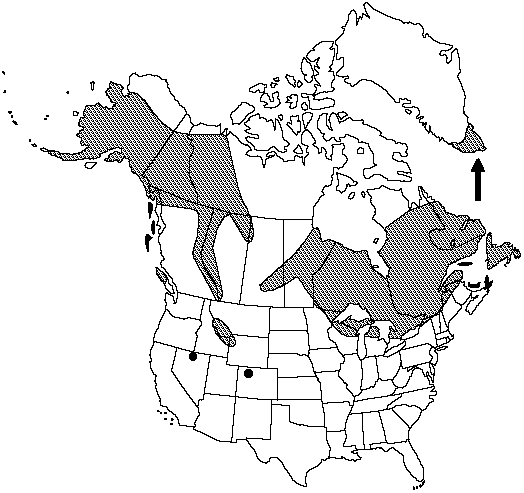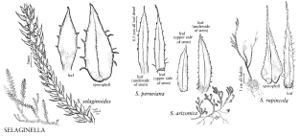Difference between revisions of "Selaginella selaginoides"
Hort. Reg. Monac. 3. 1829.
FNA>Volume Importer |
GeoffLevin (talk | contribs) m (Selaginella selaginoides) |
||
| (14 intermediate revisions by 3 users not shown) | |||
| Line 1: | Line 1: | ||
{{Treatment/ID | {{Treatment/ID | ||
|accepted_name=Selaginella selaginoides | |accepted_name=Selaginella selaginoides | ||
| − | |accepted_authority=(Linnaeus) Palisot de Beauvois ex Martius | + | |accepted_authority=(Linnaeus) Palisot de Beauvois ex Schrank & Martius |
|publications={{Treatment/Publication | |publications={{Treatment/Publication | ||
|title=Hort. Reg. Monac. | |title=Hort. Reg. Monac. | ||
| − | |place= | + | |place=3. 1829 |
|year=1829 | |year=1829 | ||
}} | }} | ||
|common_names=Northern spike-moss;prickly mountain-moss;sélaginelle fausse-sélagine | |common_names=Northern spike-moss;prickly mountain-moss;sélaginelle fausse-sélagine | ||
| − | |basionyms={{Treatment/ID/ | + | |basionyms={{Treatment/ID/Basionym |
|name=Lycopodium selaginoides | |name=Lycopodium selaginoides | ||
|authority=Linnaeus | |authority=Linnaeus | ||
| + | |rank=species | ||
| + | |publication_title=Sp. Pl. | ||
| + | |publication_place=2: 1101. 1753 | ||
}} | }} | ||
|synonyms= | |synonyms= | ||
| Line 20: | Line 23: | ||
}}<!-- | }}<!-- | ||
| − | --><span class="statement" id="st- | + | --><span class="statement" id="st-undefined" data-properties=""><b>Plants </b>on rock or terrestrial, forming loose to dense mats. <b>Stems</b> not readily fragmenting, tips not upturned; creeping stems filiform, indeterminate, branching dichotomously; upright stems stout, unbranched (3–10 cm aboveground), terminating in simple strobili. <b>Leaves</b> green, lanceolate, 3–4.5 × 0.75–1.2 mm (smaller on horizontal stems, 1/3 less than those on upright stems); abaxial groove absent; base decurrent, forming saclike structure with stem; margins with soft spiny projections, 0.1–0.2 mm; apex acuminate to subulate. <b>Strobili</b> (1–)2–3(–5) cm; sporophylls lanceolate-triangular, 4.5–6 × 1.15–1.5 mm, lacking abaxial ridges. <b>2n</b> = 18.</span><!-- |
-->{{Treatment/Body | -->{{Treatment/Body | ||
|habitat=Wet places, among mossy stream banks, lakeshores, bogs, and wet talus slopes, in neutral to alkaline soil | |habitat=Wet places, among mossy stream banks, lakeshores, bogs, and wet talus slopes, in neutral to alkaline soil | ||
|elevation=600–2900(–3800) m | |elevation=600–2900(–3800) m | ||
| − | |distribution=Greenland;St. Pierre and Miquelon;Alta.;B.C.;Man.;N.B.;Nfld.;N.W.T.;N.S.;Ont.;P.E.I.;Que.;Sask.;Yukon;Alaska;Colo.;Idaho;Maine;Mich.;Minn.;Mont.;Nev.;N.Y.;Wis.;Wyo.;Eurasia;nw Africa in the Canary Islands. | + | |distribution=Greenland;St. Pierre and Miquelon;Alta.;B.C.;Man.;N.B.;Nfld. and Labr.;N.W.T.;N.S.;Ont.;P.E.I.;Que.;Sask.;Yukon;Alaska;Colo.;Idaho;Maine;Mich.;Minn.;Mont.;Nev.;N.Y.;Wis.;Wyo.;Eurasia;nw Africa in the Canary Islands. |
| − | |discussion=<p>Selaginella selaginoides is reported to have strobili with basal megasporangia and apical microsporangia (H. T. Horner Jr. and H. J. Arnott 1963). Some individuals, however, have megasporangia at the tip of the strobili. Selaginella selaginoides is generally thought to be a primitive member of the genus (F. O. Bower 1908; T. L. Phillips and G. A. Leisman 1966; R. M. Tryon 1955), but certain of its characteristics may be derived. It is unique in having an active megaspore dispersal mechanism, termed "compression and slingshot megaspore ejection" (C. N. Page 1989), and it has a peculiar root position and development (E. E. Karrfalt 1981) probably found elsewhere only in the closely related species S. deflexa Brackenridge of Hawaii. Both features may be derived rather than primitive.</p> | + | |discussion=<p><i>Selaginella selaginoides</i> is reported to have strobili with basal megasporangia and apical microsporangia (H. T. Horner Jr. and H. J. Arnott 1963). Some individuals, however, have megasporangia at the tip of the strobili. <i>Selaginella selaginoides</i> is generally thought to be a primitive member of the genus (F. O. Bower 1908; T. L. Phillips and G. A. Leisman 1966; R. M. Tryon 1955), but certain of its characteristics may be derived. It is unique in having an active megaspore dispersal mechanism, termed "compression and slingshot megaspore ejection" (C. N. Page 1989), and it has a peculiar root position and development (E. E. Karrfalt 1981) probably found elsewhere only in the closely related species S. deflexa Brackenridge of Hawaii. Both features may be derived rather than primitive.</p> |
|tables= | |tables= | ||
|references= | |references= | ||
| Line 35: | Line 38: | ||
-->{{#Taxon: | -->{{#Taxon: | ||
name=Selaginella selaginoides | name=Selaginella selaginoides | ||
| − | + | |authority=(Linnaeus) Palisot de Beauvois ex Schrank & Martius | |
| − | |authority=(Linnaeus) Palisot de Beauvois ex Martius | ||
|rank=species | |rank=species | ||
|parent rank=subgenus | |parent rank=subgenus | ||
| Line 44: | Line 46: | ||
|habitat=Wet places, among mossy stream banks, lakeshores, bogs, and wet talus slopes, in neutral to alkaline soil | |habitat=Wet places, among mossy stream banks, lakeshores, bogs, and wet talus slopes, in neutral to alkaline soil | ||
|elevation=600–2900(–3800) m | |elevation=600–2900(–3800) m | ||
| − | |distribution=Greenland;St. Pierre and Miquelon;Alta.;B.C.;Man.;N.B.;Nfld.;N.W.T.;N.S.;Ont.;P.E.I.;Que.;Sask.;Yukon;Alaska;Colo.;Idaho;Maine;Mich.;Minn.;Mont.;Nev.;N.Y.;Wis.;Wyo.;Eurasia;nw Africa in the Canary Islands. | + | |distribution=Greenland;St. Pierre and Miquelon;Alta.;B.C.;Man.;N.B.;Nfld. and Labr.;N.W.T.;N.S.;Ont.;P.E.I.;Que.;Sask.;Yukon;Alaska;Colo.;Idaho;Maine;Mich.;Minn.;Mont.;Nev.;N.Y.;Wis.;Wyo.;Eurasia;nw Africa in the Canary Islands. |
|reference=None | |reference=None | ||
|publication title=Hort. Reg. Monac. | |publication title=Hort. Reg. Monac. | ||
|publication year=1829 | |publication year=1829 | ||
|special status= | |special status= | ||
| − | |source xml=https:// | + | |source xml=https://bitbucket.org/aafc-mbb/fna-data-curation/src/2e0870ddd59836b60bcf96646a41e87ea5a5943a/coarse_grained_fna_xml/V2/V2_344.xml |
|genus=Selaginella | |genus=Selaginella | ||
|subgenus=Selaginella subg. Selaginella | |subgenus=Selaginella subg. Selaginella | ||
|species=Selaginella selaginoides | |species=Selaginella selaginoides | ||
| − | |||
| − | |||
| − | |||
| − | |||
| − | |||
| − | |||
| − | |||
| − | |||
| − | |||
| − | |||
| − | |||
| − | |||
| − | |||
| − | |||
| − | |||
| − | |||
| − | |||
| − | |||
| − | |||
| − | |||
| − | |||
| − | |||
| − | |||
| − | |||
| − | |||
| − | |||
| − | |||
| − | |||
}}<!-- | }}<!-- | ||
| − | -->[[Category:Treatment]][[Category:Selaginella subg. Selaginella]] | + | --> |
| + | |||
| + | [[Category:Treatment]] | ||
| + | [[Category:Selaginella subg. Selaginella]] | ||
| + | [[Category:Revised Since Print]] | ||
Latest revision as of 23:53, 20 February 2024
Plants on rock or terrestrial, forming loose to dense mats. Stems not readily fragmenting, tips not upturned; creeping stems filiform, indeterminate, branching dichotomously; upright stems stout, unbranched (3–10 cm aboveground), terminating in simple strobili. Leaves green, lanceolate, 3–4.5 × 0.75–1.2 mm (smaller on horizontal stems, 1/3 less than those on upright stems); abaxial groove absent; base decurrent, forming saclike structure with stem; margins with soft spiny projections, 0.1–0.2 mm; apex acuminate to subulate. Strobili (1–)2–3(–5) cm; sporophylls lanceolate-triangular, 4.5–6 × 1.15–1.5 mm, lacking abaxial ridges. 2n = 18.
Habitat: Wet places, among mossy stream banks, lakeshores, bogs, and wet talus slopes, in neutral to alkaline soil
Elevation: 600–2900(–3800) m
Distribution

Greenland, St. Pierre and Miquelon, Alta., B.C., Man., N.B., Nfld. and Labr., N.W.T., N.S., Ont., P.E.I., Que., Sask., Yukon, Alaska, Colo., Idaho, Maine, Mich., Minn., Mont., Nev., N.Y., Wis., Wyo., Eurasia, nw Africa in the Canary Islands.
Discussion
Selaginella selaginoides is reported to have strobili with basal megasporangia and apical microsporangia (H. T. Horner Jr. and H. J. Arnott 1963). Some individuals, however, have megasporangia at the tip of the strobili. Selaginella selaginoides is generally thought to be a primitive member of the genus (F. O. Bower 1908; T. L. Phillips and G. A. Leisman 1966; R. M. Tryon 1955), but certain of its characteristics may be derived. It is unique in having an active megaspore dispersal mechanism, termed "compression and slingshot megaspore ejection" (C. N. Page 1989), and it has a peculiar root position and development (E. E. Karrfalt 1981) probably found elsewhere only in the closely related species S. deflexa Brackenridge of Hawaii. Both features may be derived rather than primitive.
Selected References
None.
